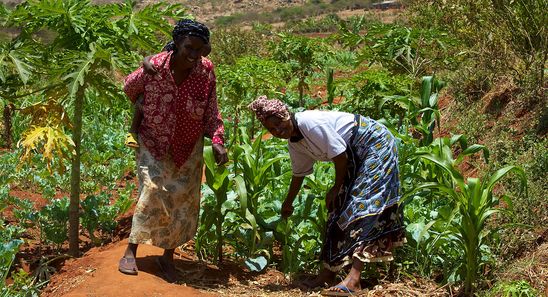Behind the Big Money to Boost Productivity for Africa’s Small and Rural Farmers
/
Over the past few years, the MasterCard Foundation has been making some hefty investments to improve the lives and livelihoods of smallholder farmers in Africa. In 2015, the foundation launched its $50 million Rural Prosperity Fund, which aims to end the poverty cycle for some 1 million of Africa’s rural poor population by improving their access to financial products and services. A big chunk of that money—$35 million—will fund development of the most promising ideas and pilot programs related to financial inclusion specifically geared toward smallholder farmers in Côte d’Ivoire, Ghana, Kenya, Mozambique, Senegal, Tanzania, Uganda and Zambia.
Related: MasterCard Launches $35 Million Rural Prosperity Scaling Competition
Also in 2015, the foundation announced a $15 million give to AGRA to support its work in expanding access to financial services to smallholder farmers in Ghana, Kenya and Tanzania. Shortly after that, the MasterCard Foundation launched a $15.4 million initiative in partnership with AgDevCo to help increase the incomes of smallholder famers in Africa through its Smallholder Development Unit.
Well, it seems like $15 million is the magic number as the foundation has announced yet another big give, this time in partnership with East Africa’s largest commercial bank, KCB Bank Group.
The foundation’s $15 million investment is part of the larger $30 million partnership, which aims to improve and promote financial inclusion for some 2 million smallholder farmers in Kenya and Rwanda. As part of the joint venture, KCB will extend at least $200 million in credit for farmers in both countries through its KCB MobiGro program.
The new $30 million partnership will focus on building the financial literacy and business management knowledge of smallholder farmers and pastoralists. A major aim, here, is for the farmers to use that know-how to improve production, stock management, and use mobile financial services to improve their livelihoods and economic security.
Of the give, Ann Miles, director of the MasterCard Foundation’s Financial Inclusion and Youth Livelihoods programs, said that the new partnership with the KCB Group will “help us understand to what extent access to mobile-based financial services and agriculture information can help smallholder farmers and pastoralists achieve higher productivity and returns.” That increased access to financial services and agricultural information will hopefully, according to Miles provide poor farmers in Kenya and Rwanda a “pathway out of poverty.”
MasterCard’s announcement of its new partnership with KCB Group comes just weeks after the foundation joined forces with Mercy Corps to launch AgriFin Accelerate in Tanzania, one of the three countries in which the program will operate. The six-year, $25 million initiative aims to “help close the gap in access to financial and information services experienced by smallholder farmers.” Particular groups of focus for the initiative are women and young people. The partners expect the program to benefit around 1 million smallholder farmers in Kenya, Tanzania, and Zambia.
It’s relatively safe to say that most of the MasterCard foundation’s financial inclusion efforts in Africa work toward closing the financing gap. Agricultural investments are risky endeavors, particularly for rural and smallholder farmers. At the same time, its big business. In a number of African countries, small farms account for huge percentages of agricultural production and act as key economic drivers. In Kenya, for example, the 3 million to 3.5 million small farmers account for some 75 percent of the countries agricultural production.
Related: AGRA and Mercy Win Big Inaugural Give from The MasterCard Foundation
According to the Food and Agriculture Organization of the United Nations, “80 percent of farmland in sub-Saharan Africa and Asia is managed by smallholders.” Overcoming the financing gap is a critical aspect of not only helping lifting small and rural farmers out of poverty, but building an increasingly inclusive economies across Africa, as well as support its burgeoning labor force which, according to MasterCard, is set to be largest in the world by 2035.
With assets of over $8.2 billion, the MasterCard Foundation is among the largest philanthropic entities in the world. And not only does this funder spend some serious cash on its programs which almost exclusively centers on helping lift people out of poverty, it does so consistently. As for its support of Africa’s agricultural sector, the foundation has already invested around $175 million in such projects, and that number is clearly set to increase in the coming years.








